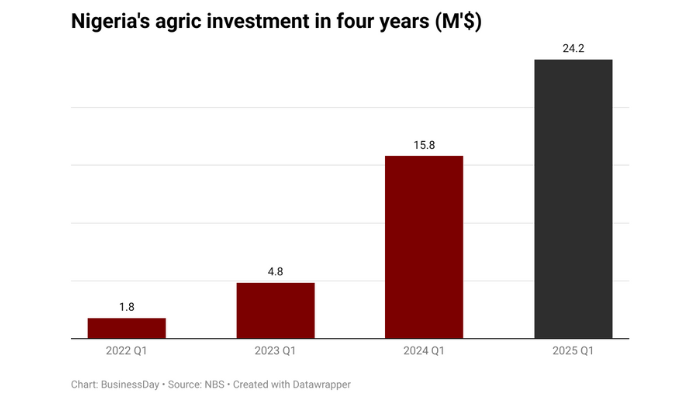Foreign direct investment (FDIs) into the agricultural sector surged to its highest in four years, driven by a surge in the livestock subsector.
Food sectorŌĆÖs FDI rose by over 1,000 percent to $24.25 million (N3.7 trillion) in the first quarter (Q1) of 2025 from $1.76 million (N268.6 billion) in the corresponding quarter of 2022, according to a BusinessDayŌĆÖs analysis of the Capital Importation Data.
Experts say the growth signals the huge potential of the agric sector and the boost in investorsŌĆÖ confidence despite worsening insecurity.
Findings by BusinessDay show that the livestock subsector ŌĆö a component of the agricultural sector ŌĆö received several international investments in Q1, amounting to at least $11.6 billion during the period.
Read also:┬ĀAdamawa government approves N5b supports for livestock, grain markets
JBS, a Brazilian meatpacking company, poured money into the establishment of a 100,000-hectare cattle ranch in Niger and for the modernisation of a meat processing facility in Ogun State as part of efforts to boost the livestock value chain.
Chi Farms Nigeria Limited has invested in NigeriaŌĆÖs livestock and sets its sights on a $2.5bn livestock investment in its Ogun State farm.
ŌĆ£This is a general wake-up call to people that there is a lot of money to be made in agriculture,ŌĆØ said Ibrahim Kabiru, president of All Farmers Association of Nigeria (AFAN).
He said, ŌĆ£With the growing population, Nigerians require more food than ever before.ŌĆØ
Kabiru added, ŌĆ£There is a clarion call to eat what we produce and produce what we eat.ŌĆØ
He said this first took effect under the late President Buhari through investments from the African Development Bank (AfDB).
He explained that there have been several investments by the international governments. ŌĆ£And then, lately, we know we have gained a lot of traction in investments from Brazil and other countries,ŌĆØ he noted.
In the same review period of 2015, agriculture attracted a meagre $2.68 million, reflecting a remarkable shift in the sector in 10 years.
Similarly, on a quarter-on-quarter basis, Q1 investments surpassed Q4 by 49 percent ($16.24 million).
Ayo Teriba, chief executive officer of Lagos-based Economics Associates, said,ŌĆ£Investors are responding to the opportunities created by the federal government in the sector,ŌĆØ noting that this opens a pathway for future investors who would like to explore agriculture.
Experts say that the rise in investment in the food value chain, especially into the livestock industry, represents a potential boom for the N33 trillion national livestock market.
The federal government inaugurated the Ministry of Livestock Development in 2024 to rejuvenate the value chain hard hit by farmer-herder clash, under-investment and poor coordination.
Read also:┬ĀDoorcas Africa uses data to help Nigerian farmers prevent livestock deaths
With 58 million cattle, 563 million poultry and 60 million sheep, the livestock value chain holds the key to improving income and enhancing greater output.
According to the Central Bank of Nigeria (CBN), Nigeria spends an average of $1.3 billion annually on dairy imports, pointing to the need for rapid investment in local production.
The NBS reports that the agric sector was the seventh highest contributor in the review period with 0.43 percent to total capital importation of $5642.07 million.
ŌĆ£But we need more. People need to eat more. While we see growth on paper, we also know that many more people are hungry in reality,ŌĆØ Kabiru, earlier mentioned, said.











